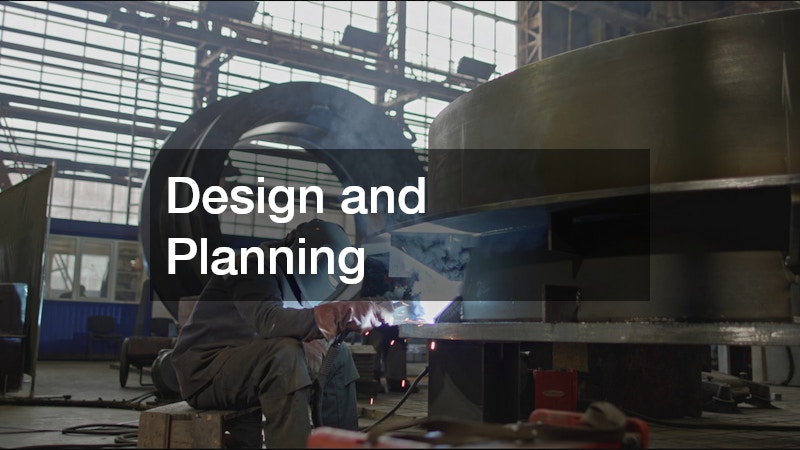In this article, we will explore the role and capabilities of metal fabricators in bringing your ideas to life from initial concepts to tangible creations. We’ll address common questions about their processes, capabilities, and the benefits they offer in manufacturing and construction industries. Understanding their value can significantly impact the outcome of your projects, making it crucial to consider their services.
Definition and Overview
Metal fabrication involves the creation of metal structures by cutting, bending, and assembling processes. It is a pivotal aspect of various industries, from construction to manufacturing, translating theoretical designs into practical applications. The industry is vast, with an array of methodologies and technologies tailored to meet the diverse needs of its clientele.
Precise fabrication is essential for the structural integrity and functionality of metal products. The process can involve both manual and automated techniques, depending on the project’s complexity and scale. Advances in technology have enhanced the precision and efficiency of metal fabrication, making it indispensable in modern engineering and construction.
Applications in Various Industries
Metal fabrication finds application in numerous sectors, from the automotive industry, where it helps in building vehicle frames, to the aerospace sector, where precision and lightweight materials are critical. The construction industry heavily relies on metal fabrication for structures like beams, bars, and even complete frame systems. This widespread application underscores the versatility and adaptability of metal fabricators to different industry requirements.
In the energy sector, fabricated metal products are crucial in constructing pipelines, oil rigs, and wind turbines. Metal fabricators provide the necessary components that ensure durability and resilience in extreme conditions. This application of metal fabrication is vital for sustainable energy solutions and infrastructural advancements globally.
Advantages of Professional Fabrication Services
One of the primary advantages of professional metal fabrication services is the level of precision they bring to each project. Professional fabricators leverage state-of-the-art technologies to achieve tight tolerances and meet complex design specifications. This precision is critical for ensuring that each component fits perfectly into larger assemblies or structures.
Professional fabricators also offer efficiency in production through advanced machinery and skilled labor. By streamlining the fabrication process, they can reduce turnaround times without compromising quality. This efficiency translates to cost savings for clients, making professional services a valuable investment for any large-scale manufacturing or construction project.
Design and Planning
The design and planning phase is crucial to the success of any metal fabrication project. It involves collaborating with clients to translate concepts into detailed technical drawings and plans. Professional fabricators use CAD software to visualize the final product and ensure all specifications are accurate before production begins.
During this phase, factors such as material selection, cost estimation, and timeline projections are considered. An experienced fabricator will assess the feasibility of the design and make recommendations to optimize it for manufacturing. This stage is critical for identifying potential challenges and ensuring the project stays within budget and on schedule.
Cutting and Forming
The cutting and forming stage involves transforming raw metal into the desired shapes and sizes required for the final product. Advanced machinery, such as CNC machines and laser cutters, are employed to ensure precision in these processes. These tools can handle various metals, from steel to aluminum, catering to a wide range of project needs.
Forming processes like bending, rolling, and stamping are used to give metal components their structural integrity and desired contours. The choice of forming method depends on the metal type, component design, and intended application. Skilled technicians ensure that these processes are executed accurately to maintain quality and performance standards.
Finishing and Assembly
Once the components are cut and formed, the finishing process begins to enhance appearance, durability, and performance. Techniques such as welding, sandblasting, and painting are used to achieve the desired finish and protective coatings. Post-fabrication treatments also include anodizing or galvanizing, which enhance corrosion resistance and extend the product lifecycle.
Assembly involves combining individual components into a complete product or structure. This stage requires meticulous attention to detail to ensure all parts fit together correctly and the final assembly meets structural and functional standards. Experienced fabricators use assembly jigs and fixtures to maintain consistency and accuracy throughout this process.
Evaluating Experience and Expertise
Choosing the right metal fabricator demands a thorough evaluation of their experience and expertise. Examining their portfolio of completed projects helps identify their capability to handle similar tasks. Long-standing experience in the industry is often an indicator of reliability and skill, crucial factors for successful project execution.
Certifications and accreditations can provide insights into the competence of a metal fabricator. These endorsements typically signify adherence to industry best practices and commitment to ongoing training and development. Additionally, client testimonials and reviews can offer valuable perspectives on the fabricator’s reputation and service quality.
Understanding Cost and Timeline
Cost considerations are a crucial factor when selecting a metal fabricator. A transparent breakdown of costs, including materials, labor, and any additional expenses, helps set realistic budget expectations. Discussions about cost should also consider the potential for unforeseen expenses and how they might be managed within the agreed budget.
Metal fabricators play a crucial role in the journey from an idea to a finished product. Their skills and technologies transform concepts into tangible solutions used across various industries. By understanding the processes and considerations involved, customers can better engage with these professionals, ensuring their projects are completed efficiently and to high standards.

